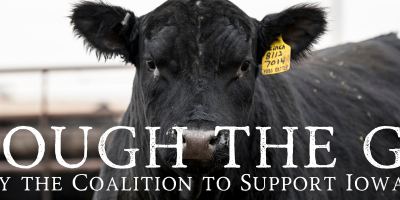CSIF Tips of the Month – June 2013
06-05-2013 in Through The Gate
Rules and Regs Highlight
Manure storage structures and rainfall: Have a plan
Due to the numerous rainfall events this spring, there has been some concern about lagoons and basins overflowing. If these rains continue, and you have an engineered manure storage structure, be sure to contact your engineer to determine the best way to de-water it to prevent a discharge from occurring and/or damage to the structure from happening.
It is also a good idea to review your NPDES permit (if you have one), manure management plan (MMP) or nutrient management plan (NMP) every year, especially before spring precipitation events and in the fall, prior to land application.
Additionally, the Coalition recommends having a farm emergency action plan in place to help recover from natural disasters.
If you think you may run into trouble with your manure storage structure this spring, give the Coalition a call at 800-932-2436 for further advice.
Changing crop rotations: What it means for manure applications
If you’ve already applied manure on fields, and now, due to planting delays, are thinking about switching those fields from corn to soybeans, make sure you understand the rules.
Angela Reick-Heiz with the Iowa Manure Management Action Group explains in this article.
Applying for EQIP
If you’re applying for EQIP, or have filed for EQIP, double-check to make sure you’re following all of the guidelines set forth by the program. In the past few months, there has been some confusion on the requirements livestock farmers must comply with.
To be sure your farm remains in compliance as you make changes, call the Coalition at 800-932-2436.
Siting Tip
Be open-minded in site selection
The “old farm place” certainly has sentimental value, as it represents several generations of farmers in your family. But, as you’re looking to grow your farm, don’t assume that is the best spot. Keep an open mind as you consider possible sites.
Before you grow, be sure to have a professional out to look at the existing facilities and help you understand the current rules and regulations that apply. Once that is established, you can then discuss both short-term and long-term growth plans. The larger your farm gets, especially with confinement livestock facilities, the more stringent the rules and regulations become. It is extremely important to plan accordingly from the beginning.
The Coalition to Support Iowa’s Farmers can help – whether it’s over the phone or a personalized farm consultation – staff members can help you interpret regulations and find the best site. Call 800-932-2436 to get started.
Quote of the Month: Ted and Ben Novak
Ted and Ben Novak, Tama County farmers, were looking to grow their farm and quickly discovered a difficult-to-understand maze of rules. They called CSIF for assistance interpreting the rules that applied to their situation.
“We wanted to do things right and not just meet, but exceed the rules and regulations,” said Ted Novak. “CSIF was a valuable resource for us. They made multiple trips to our farm to assess our current situation and served as a sounding board for us.”
“The number one service the Coalition provided was helping us understand the rules and regulations as we bounced ideas off them,” said Ben Novak. “CSIF helped us take a proactive approach to reaching our goals and helping us grow our farm responsibly.”
Hear more from the Novak’s here.
Recommended News

Through the Gate // May 2025
Stay updated with the Coalition to Support Iowa's Farmers. Discover events and more.
Read More
Through the Gate // April 2025
Stay updated with the Coalition to Support Iowa's Farmers. Discover events and more.
Read More
Through the Gate // March 2025
Stay updated with the Coalition to Support Iowa's Farmers. Discover events and more.
Read More